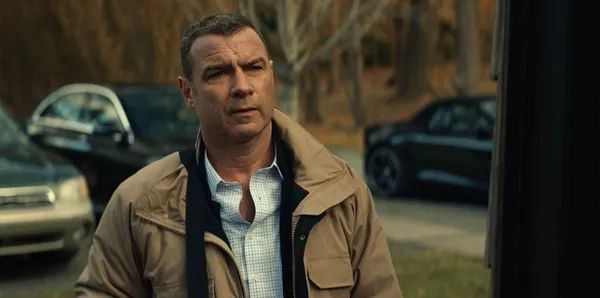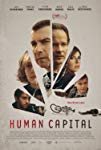Eye For Film >> Movies >> Human Capital (2019) Film Review
Human Capital
Reviewed by: Jennie Kermode

Human Capital invites us to query how much the wealthy care about the rest of us. It might prompt some viewers to wonder how much they care about the wealthy.
If the title seems familiar, that's because this is an adaptation of Stephen Amidon's novel, which was also adapted by Paolo Virzì in 2013. That version won considerable acclaim, raising the question of what Marc Meyers hoped to achieve with this one beyond the avoidance of subtitles for English-speaking readers. Oren Moverman's is a much more pared down take than Virzì's and shorn of much of its glamour; it's a story in which the mechanics of trading are more obvious at the outset, which adds to its realism but detracts from its power. There is little opportunity to be beguiled and so it becomes harder to understand how this happens to the characters, harder to forgive them for what they do to themselves.

Liev Schreiber plays Drew, a modestly successful real estate manager who has managed to set aside the kind of money which, to most of us, is a small fortune, but which doesn't really count for much of anything where big investors are concerned. This is problematic for two reasons. First, he's about to discover that he has twins on the way, so he can't afford to wait for the investment he makes to ripen. Second, the hedge fund manager he trusts it to, Peter Sarsgaard's Quint, is both less competent and less sympathetic than Drew assumes based on the fact that their children are dating - a relationship which is, in itself, not what it appears to be. Drew lies about how much money he actually has and overextends himself, wanting to play with the big boys; Quint struggles to maintain even the degree of empathy he needs to keep his personal life together; Quint's dilettante wife Carrie (Marisa Tomei) embarks on one of those affairs that seems less abut lust or romance and more about fear of getting old; and Drew's daughter Shannon (Maya Hawke) is falling for a boy whom Drew regards in the same way that Quint regards him.
All these stories intersect one night when a young waiter - who is introduced in a scene so brief that you could easily miss it, and whose role as a service provider gives him a status even lower than that of Shannon's beau - is struck by a car on his way home. We see the events leading up to this from three different points of view, each act filling in detail missing from the last. There's little direct repetition and the mystery unfolds at a satisfying pace, but ultimately the factual matter of who is directly to blame comes to seem less important than the further layers of injustice with which the incident is surrounded.
Although the acting here is uniformly good, both Schreiber and Tomei struggle to bring much life to characters whose encounters with difficulty come so late in life that they seem singularly unengaged with the world. Hawke is the standout in an unusually well fleshed-out teenage role. The central puzzle is pleasing enough and there's some nice technical work but overall the film is too disconnected to make an emotional impact on an audience. it has achieved the distance, the abstraction that characters like Quint strive for, and as it successfully grasps their world it loses its grip on why all these events matter. The result is something polished and marketable but all too forgettable.
Reviewed on: 21 Mar 2020

















